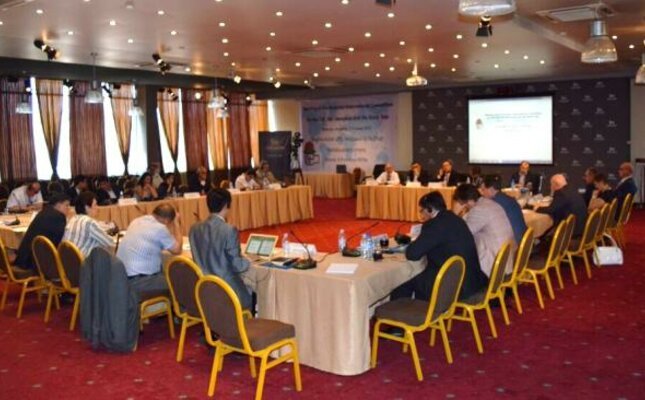The SI Committee for the CIS, the Caucasus and the Black Sea met in Yerevan, Armenia on 8-9 June 2015, hosted by the SI member party in that country, the ARF Socialist Party. The meeting, which was opened by SI Secretary General Luis Ayala, was chaired by Armen Rustamyan (Armenia ARF, co-chair of the committee), Alexandra Dobolyi (Hungary MSzP, co-chair of the committee) and Oleg Tulea (Moldova PDM, vice-chair of the committee). Delegates from countries across the region discussed the three themes on the agenda, namely the regional priorities of strengthening and extending democracy, securing peace and the resolution of conflicts, and advancing the social democratic agenda.
The meeting was marked by the presence of a delegation from the SDPA, the SI member party in Azerbaijan, whose full participation in the meeting and discussions symbolised the spirit of cooperation and dialogue that characterises the global social democratic movement. Regardless of the ongoing tensions between Armenia and Azerbaijan, representatives from the ARF and SDPA engaged in fruitful exchanges over the two days. At the conclusion of the meeting, members of the committee adopted a declaration that encompassed the main points of agreement.
At the opening of the meeting, all those present observed a moment's silence in memory of Vahan Hovanessian, former leader of the ARF and co-chair of the committee, who passed away in December 2014.
On the theme of conflict resolution, the committee reiterated the fundamental belief of the international that peace is necessary for development and prosperity. The declaration reflected the established position of the International on the need for dialogue as a means to bring unresolved conflicts to an end. The committee further called for a ceasefire and respect for international law in eastern Ukraine, and adherence to the provisions contained in the Minsk II agreement.
Conflict is also linked to democracy, as the establishment of genuine democracy can help to eliminate the deficit in rights and freedoms that is a cause of conflict. In-depth exchanges took place on strengthening and extending democracy in recognition of the lack of effective democracy in the countries represented at the meeting. Delegates reflected on the need for the free expression of political will and discussed ways in which member parties of the Socialist International in the CIS, Caucasus and Black Sea could better cooperate to advance shared aims.
Democracy is not just about elections, but is also reflected in the opportunities granted to opposition parties in the period between elections. In a functioning democracy the opposition has an important role as a counterweight to the government and able to ensure that it does not rule without scrutiny. The severely diminished and suppressed opposition in many countries of the region is left neither able to hold the government to account nor build for future elections.
Participants also agreed to place strong emphasis on the social democratic agenda as a way to better communicate the message of social democracy. It was agreed that social democracy was greatly needed in the region in order to present a viable alternative to nationalism and neo-liberalism. The social democratic ideology, which focuses on the needs of all rather than a privileged few, should resonate with citizens deprived of their rights under authoritarian and anti-democratic regimes.
One particular area in which members of the SI were taking the lead was in the fight against corruption, which must be eliminated with the help of reinforced institutions, a strong and independent judiciary and a clear and transparent framework for the pursuit and eradication of financial misconduct.
The reports on national situations in the countries represented were given in the context of the themes of the meeting. Delegates heard how new presidential elections in Belarus would take place later in 2015 despite the continued imprisonment of presidential candidate Mikalai Statkevich following the previous elections. A message from Statkevich was read out in which he thanked the SI for its support and reaffirmed his commitment to freedom, justice and solidarity.
Democracy is also absent in Tajikistan, where the ruling elite has vastly superior power and resources and is denying fundamental rights. An increase in ethnic and religious tensions has also contributed to a precarious situation. The opposition had been denied its democratic right in Kazakhstan, where the SI member party the OSDP was preparing for the next parliamentary elections and trying to present an alternative to the dominance of the ruling party. Azerbaijan also reported problems with elections and public administration.
In Armenia, the ARF was making efforts to improve the system of governance, as this would bring about more effective development and strengthen democratic pluralism. This was a great challenge due to the lack of influence wielded by the opposition and a void in between elections. Progress had been made on democracy in Georgia at the 2012 election, but the ruling coalition had not yet been able to overcome the country's economic obstacles, and the task for social democrats was to engage students, trade unions and workers to change the neoliberal consensus. Difficulties of a different nature had been experienced by the SI member party in Moldova, where delays in forming a coalition and a banking scandal had left the situation unstable.
The committee was updated on latest developments in Ukraine, and heard calls from the representative of that country for withdrawal of forces and respect for the integrity of Ukraine's borders. Democracy in Ukraine was also experiencing severe difficulties, with the authorities trying not to allow room for new political parties to operate. The Russian delegation called for a focus on the social democratic agenda in the region, to counteract neoliberal and neo-nationalist powers which were turning the post-Soviet region into a battlefield.

